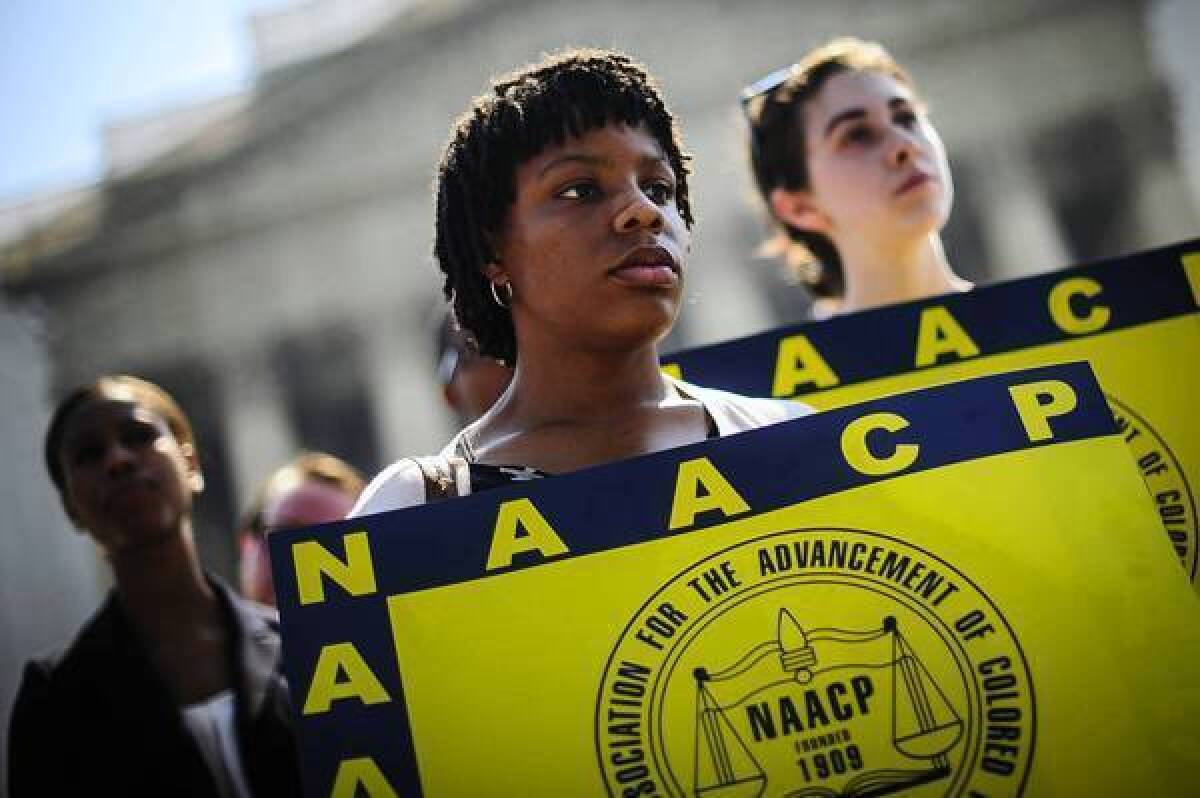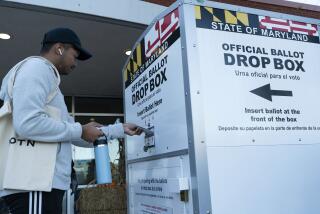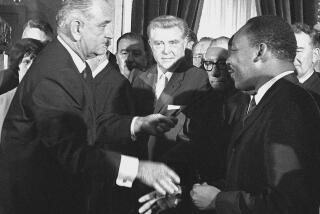Supreme Court kills Voting Rights Act federal oversight provision

WASHINGTON — A sharply divided Supreme Court has struck down a key part of the historic Voting Rights Act of 1965, freeing the Southern states from federal oversight of their election laws and setting off a fierce reaction from civil rights advocates and Democratic leaders.
The court’s conservative majority moved boldly Tuesday to rein in a law revered by civil rights groups that is credited with transforming the South by ensuring blacks could register and vote. In doing so, the court eliminated a tool that the Justice Department used hundreds of times to prevent cities, counties and states from adopting allegedly discriminatory voting rules.
The court left open the possibility that Congress could fix the law, but the partisan gridlock that has dominated the legislative branch in recent years appears to make that unlikely.
Under the provision that the court struck down, nine states and the city councils and local governments within them were required to obtain advance approval from Washington before changing their rules on voting and elections, a process known as “pre-clearance.” The goal was to end the discriminatory schemes that for a century after the Civil War had prevented blacks from registering and voting. More recently, the law has been used to ensure that black and Latino votes translate into electoral power.
Since it was first adopted in 1965, the law has been repeatedly extended by Congress, most recently by a nearly unanimous vote in a Republican-controlled House and Senate in 2006.
Speaking for a 5-4 majority, Chief Justice John G. Roberts Jr. pronounced the pre-clearance process a “resounding success” — and then declared it unconstitutional.
The problem, Roberts said, is the formula that Congress wrote for deciding which jurisdictions must seek pre-clearance. That formula has not been updated since the 1970s, and that, he said, is unacceptable.
“African American turnout has come to exceed white voter turn out in five of the six states originally covered” by the 1965 law, and it is nearly equal in the remaining original states, he said. The Constitution rests on the “fundamental principle of equal sovereignty among the states,” Roberts said, and if Congress is to single out some of them for special oversight, it must do so “in light of current conditions. It cannot rely simply on the past.”
The decision left the pre-clearance requirement intact, but empty of significance because it cannot be applied to any jurisdictions unless Congress updates the formula.
The decision is likely to be felt in small towns and cities across the South, legal experts said. Statewide changes in election laws usually draw notice — and sometimes, legal challenges — but similar changes on a local level can go unnoticed and uncontested.
Writing for the court’s four liberal members in dissent, Justice Ruth Bader Ginsburg denounced the majority for “hubris.” The 15th Amendment, which gave black people the right to vote after the Civil War, gave Congress the power to enforce those rights, Ginsburg wrote, and the court was wrong to substitute its judgment.
Moreover, the improvements that Roberts cited had happened precisely because the law had worked, she said.
Civil rights leaders said they were surprised and disappointed.
Rep. John Lewis (D-Ga.), a hero of the civil rights movement, said the Supreme Court “had stuck a dagger in the heart of the Voting Rights Act of 1965. They’re saying, in effect, that history cannot repeat itself. But I say, come and walk in my shoes.” Lewis was badly beaten by Alabama police in the “bloody Sunday” march across a bridge in Selma, Ala., an incident that helped spur Congress to adopt the Voting Rights Act.
This “is an act of extraordinary judicial overreach,” said Sherrilyn Ifill, president of the NAACP Legal Defense Fund. “By second-guessing Congress’ judgment … the court has left millions of minority voters without the mechanism that has allowed them to stop discrimination before it occurs.”
She said that all of the provisions of the Voting Rights Act were still needed today. In the last 25 years, it has “stopped over 1,000 proposed discriminatory voting changes from taking effect,” Ifill said. And last year, it put on hold new laws in Florida, Texas and South Carolina that would have limited voting hours or added photo identification requirements, she said.
The states covered under the Voting Rights Act were Alabama, Georgia, Mississippi, Louisiana, South Carolina, Texas, Virginia, Arizona and Alaska. Also included were five counties in Florida, three boroughs in New York City and three counties in Central and Northern California — Monterey, Kings and Yuba.
At first, the covered jurisdictions were those that used literacy tests or poll taxes. In the 1970s, the formula was expanded to include jurisdictions where less than 50% of the eligible residents voted.
Despite Tuesday’s ruling, most of the law still stands. It forbids rules, procedures or laws in all 50 states that “deny or abridge the right … to vote on account of race or color.” It can be enforced by the Justice Department or through private lawsuits, but advocates say these suits are costly, complicated and cumbersome. And they often cannot prevent discriminatory laws from going into effect.
“Congress may draft another formula based on current conditions,” Roberts said, but it cannot rely on “a formula based on 40-year-old facts having no logical relation to the present day.”
It is not clear whether a politically divided Congress could devise a new formula. Senate Majority Leader Harry Reid (D-Nev.) promised to try. He called Tuesday’s decision “a deeply disappointing example of extreme judicial activism. Now it is up to Congress to right the wrong of this decision and ensure we do not turn back the clock on America’s progress,” he said.
But Sen. Charles E. Schumer (D-N.Y.) said he was doubtful. “As long as Republicans have a majority in the House and Democrats don’t have 60 votes in the Senate, there will be no pre-clearance,” he said.
The issue could create a new headache for some Republicans who have wanted the party to reach out to minority voters. Others, however, applauded the decision. Texas Gov. Rick Perry called it a “clear victory for federalism and the states.” Texas “may now implement the will of the people without being subjected to outdated and unnecessary oversight and the overreach of federal power,” he said.
Sen. Ted Cruz, another Texas Republican, agreed. The decision means “second-guessing by unelected federal bureaucrats no longer survives constitutional scrutiny,” he said.
The decision could clear the way for Texas to put into effect a new voter identification law and a redistricting plan for its congressional seats. Both were put on hold by federal judges based on the Voting Rights Act. Judges said the GOP-drawn districts undercut the voting power of the growing Latino population.
House Majority Leader Eric Cantor (R-Va.), who has been leading an outreach effort to minorities for his party, offered Democrats some hope.
“I’m hopeful Congress will put politics aside … and find a responsible path forward that ensures that the sacred obligation of voting in this country remains protected,” he said in a statement.
Four years ago, the high court took up a major challenge to the Voting Rights Act, but the justices stopped short of striking down its key provision. “Things have changed in the South,” Roberts said then, warning that Congress needed to update the formula on who was covered. Congress took no action in response, Roberts noted Tuesday.
Last year, the court voted to take up a new challenge from Shelby County, Ala., and this time Roberts decided the law could not stand. Justices Antonin Scalia, Anthony M. Kennedy, Clarence Thomas and Samuel A. Alito Jr. joined to make the majority in Shelby County vs. Holder.
Usually, when the court strikes down a law as unconstitutional, the justices point to a particular provision in the Constitution. Roberts suggested vaguely that the Voting Rights Act violated the 10th Amendment and quoted his own decision of 2009 invoking the “fundamental principle of equal sovereignty among the states.”
Paul West and Michael A. Memoli in the Washington bureau contributed to this report.
More to Read
Start your day right
Sign up for Essential California for news, features and recommendations from the L.A. Times and beyond in your inbox six days a week.
You may occasionally receive promotional content from the Los Angeles Times.







